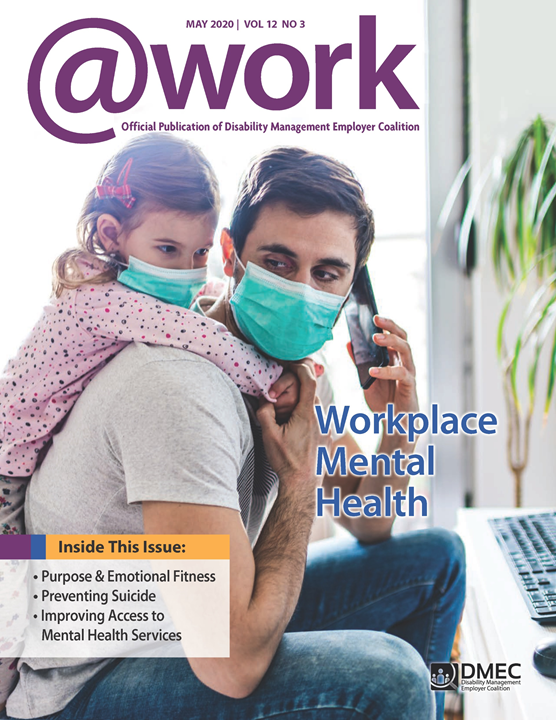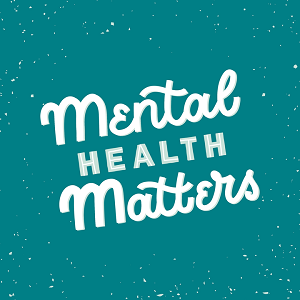
May 2020
Workplace Mental Health
The COVID-19 pandemic has highlighted the crucial importance of workplace mental health programs and resources. To help employers meet the mental health challenges of this unprecedented time, this issue of @Work provides a wealth of strategies to improve access to resources and care, encourage participation, and build effective programs.
Features
Promoting Emotional Fitness by Instilling Organizational Purpose in the Workplace
Purpose in life has emerged as an important concept in the workplace, with employers focused on applying this in areas of recruiting and retaining talent, and engagement. Recent research has shown that employees who are purpose-driven have better performance, improved leadership skills, more growth, and more promotions. Read more.

Employers Can Play a Critical Role in Preventing Suicide
Coping with depression, anxiety, and loss can manifest itself in many ways, and the signs are often overlooked, particularly in the workplace. By creating a transparent and open work environment, employers can do much to help those currently suffering in silence. Read more.

Improving Access to Behavioral Health Services in the Workplace
Behavioral health conditions are on the rise in the United States and can have a significant impact on overall workplace productivity. These conditions are a leading cause of disability for employers, and early intervention is necessary to manage absences. Read more.

Spotlight Articles
Program Showcase: Mental Health Resources
While many companies offer a myriad of mental health benefits, employees often are uncomfortable seeking them out and have trouble finding them. Employers can address these issues by taking the first step of providing coordinated communications that show all mental health benefits together. Read more.

Program Showcase: Substance Abuse Prevention
Substance use conditions have been a significant focus in workplaces over the last two decades, particularly with respect to the opioid epidemic and the movement to legalize marijuana. While employers remain mindful of additional substance use conditions, they must implement comprehensive programs to mitigate and minimize the impact of substance use on their workforce. Read more.

Program Showcase: Postpartum RTW
With the powerful impact of postpartum depression on employees, employers are also negatively impacted. The health and well-being of employees is directly linked to overall productivity, which in turn affects business profits. To mitigate this situation for employees and save their own bottom lines, employers are investing in prevention and intervention. Read more.

Columns
Absence Matters: Feel Better with a Good Night’s Sleep
According to the Centers for Disease Control and Prevention, adults between the ages of 18 and 64 generally need between seven to nine hours of sleep per night. Both quality and quantity of sleep are important. Sleep is a restorative process that is essential to physical and mental well-being. Read more.

Integrated Absence Management: Disability & Retirement Plans
Increasingly, American workers may be at risk of losing their retirement savings if disabling illness occurs. This is becoming more common, and employers, insurers, and benefit managers can play key roles in helping to prevent this problem. Read more.

Engaging Today's Workforce: Best Practices for Mental Wellness
Stress and anxiety among U.S. workers is a growing trend. With new ways of working, ever-changing business expectations, and technology advances, an even more blurred line between personal and professional stress is occurring for most workers today. Read more.

Employer Solutions: Mental Wellness
Accommodation discussions involving mental illness may cover topics that make employees uncomfortable. When those discussions do occur, employers must be willing to carefully listen and consider accommodations for the employee, while still being mindful of the business needs. Read more.

FMLA & ADA Medical Information: ADA Provisions
The ADA allows that when an employee is a “direct threat” to themselves or others, the employer may make further medical inquiry. Here are some best practices for when to use that tool, and what to expect when you do. Read more.

IAM Technology Tips: Mental Health
When a mental health condition impacts an employee’s work performance, an employer must balance the duty to accommodate under the Americans with Disabilities Act, maintaining a safe work environment, and employee productivity. Read more.

Absence & Accommodation Technology: System Selection
When looking for technology to support your accommodation program, it’s crucial to consider the depth of functionality offered by each system you review. At a minimum, you need a system that centralizes all accommodation data. Read more.

Common Sense Compliance: Employee Mental Health
Employers can incentivize healthy behavior in a number of ways while leveraging existing communication channels and benefits programs. Here are some tips for supporting mental health at work. Read more.

A Clinician's Viewpoint: Avoid a Disability Mindset
We have all seen cases involving a “simple” back sprain claim that still remain open a few years later with no sign of the claimant ever returning to pre-injury functional level. What is the difference between this claim and a similar one that closed as expected? The “disability mindset.” Read more.

Workplace Mental Health: Effective Initiatives
Mental health conditions are common, yet only about half of those affected receive treatment. The good news is that treatment works for common conditions such as anxiety and depression. Many employers are playing a key role in promoting mental health and well-being, working in the three broad areas. Read more.

Benefits & Risk Management: Disability, Depression, and Benefits
An employee is off work due to a serious workers’ compensation claim event. What if this previously successful, thriving employee becomes depressed while on claim? This is the point where your organization needs the benefits and risk management functions to collaborate. Read more.

Departments
The CEO's Desk: Mental Wellness in the Pandemic
What a different world we live in today. None of us could have imagined the sudden and deeply impactful way COVID-19 has affected our businesses and our personal lives. As an absence management professional, you hold a unique position during this uncertain time. Read more.

DMEC Special Feature: Staying Aware of Our Mental Health During This Pandemic
The most important thing we can do right now for our kids and our families is to take care of ourselves. If we don’t do the basics to ensure we remain mentally healthy, we will not be capable of caring for those around us. We can get through this. Together. One day at a time. Read more.

DMEC News: May 2020
The May 2020 DMEC News features COVID-19 resources for members, a new format for DMEC's FMLA/ADA Training for Supervisors and Managers, and an overview of the 2020 DMEC Online Compliance Conference. Read more.

Compliance Memos: May 2020
The May 2020 compliance memos cover the Families First Coronavirus Response Act, the Coronavirus Aid, Relief, and Economic Security Act, and city and state COVID-19 benefits & protections. Read more.





